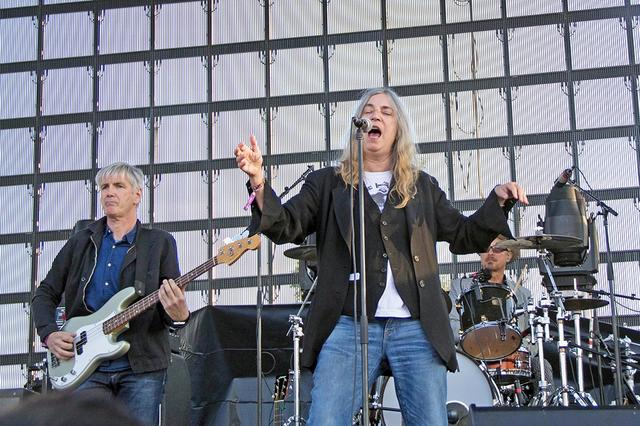Patti Smith Receives Chicago Tribune Literary Award
By Jaclyn Bauer in Arts & Entertainment on Nov 3, 2014 8:00PM

Patti Smith performs at Riot Fest 2014. (Photo credit: Jessica Mlinaric/Chicagoist)
The Chicago Tribune, in conjunction with the Chicago Humanities Festival, hosts its annual book awards “as part of the company’s ongoing commitment to the written word and its support of literacy and the literary arts.” Singer and poet Patti Smith was awarded the Chicago Tribune Literary Award Saturday at Symphony Center as part of CHF's 25th anniversary. The award is a lifetime achievement award given to an author whose body of work has had great impact on American society. Margaret Atwood, Elie Wiesel, Joyce Carol Oates and Sam Shepard are only a few among the pantheon of past recipients.
Chicago native Smith received the award for her most recent work of nonfiction Just Kids, a memoir detailing her relationship with photographer Robert Mapplethorpe. At Saturday’s sold out reception ceremony, Smith and Chicago Tribune Music Critic Greg Kot chatted about her experiences as a writer, musician and woman paving her own path through the world.
Smith initially talked of her childhood heroes: Peter Pan, Jo March and Johnny Carson to name a few. She described her childhood self as strong, independent, a dreamer, a loner and book lover. She recalled how she would put books under her pillow in hopes to dream them, and begged her mother to teach her how to read before she even hit school age.
She later developed an affinity for 18th and 19th century art, particularly French literature. She joked that she was sure she had to have some French in her because of her passionate draw toward French art, literature and culture, but declared she was in fact purely English and Welsh. Her early artistic and literary influences “opened channels and triggered [her] imagination” in such a way that it didn’t matter if she fully understood everything she was reading or not. “Sometimes you’re moved just because you are,” Smith stated matter-of-factly.
When asked about her experiences in New York City in the late 1960’s Smith reminisced about the golden age of rock, art and counterculture. She noted that she chose New York as her destination because at that time it was not the prosperous city it is now. “It was struggling. I was struggling. We were poor together,” Smith stated. Conjuring up memories and images of a much different time, Smith lamented our dependence on technology, credit cards and other luxuries. She explained that because such luxuries have in fact become more of necessities, it makes it difficult for young people to do what she did in her youth: i.e. move away penniless in search of yourself and make your way in a big city.
Once Smith began to perform her poetry live, she began to make her way as an artist. It was at the behest of Mapplethorpe that she even considered performing her poetry live. Mapplethorpe was Smith’s roommate at the time, and he witnessed her energy driven creative process and felt the electric presence of her physical self within her poetry, so he urged her to perform her written word as spoken word. Smith admitted that Mapplethorpe had something she didn’t: self-confidence. Something in fact that she still calls upon him to imbue her with during tough times.
With Mapplethorpe’s encouragement, Smith performed her poetry live accompanied by Lenny Kaye on guitar. Immediately following these very controversial performances, Smith was inundated with attention and offers to record, perform and essentially sell herself to the media. Smith declined all of these offers, stating that none of them were her path: she was still finding out who she was and she wanted to choose a path on which she could make her own decisions. She would eventually release her debut album Horses, which would prove to have a profound impact on the rock and roll scene at the time.
Smith laughed when Kot brought up her various appellations, including "The Princess of Piss" and the "Godmother of Punk." Smith explained that these have all been attempts not only to label her, but to market her to different populations. “We’ve never had a proper label,” she explained, “because we don’t want one.” She was good-natured when she detailed the evolution of her given names, laughing that soon the media will start calling her The Dinosaur of Punk.
She admitted that she embraces a part of her that is that punk rocker, but in her music it was “only in anticipation of something bigger.” She thought of herself as a Paul Revere of rock and roll in a time when the cultural voice of the 60’s and 70’s was dissipating with the death of Jimi Hendrix, Jim Morrison and Janis Joplin. In the wake of stadium rock and at the advent of the apparent end of rock, Smith merely meant to step in and hold down the fort until rock picked up steam again: instead she made an indelible mark.
Smith closed with a performance of two original songs, one in honor of her late husband Fred "Sonic" Smith, the other a tribute to William Blake and the artistic process. Her performance was electrically charged with the raw energy of passion, talent and soulful self-recognition. Smith not only stands as a statement to the perseverance of rock and roll through all of its hardships, but also to poetical genius, to the longevity of counter cultural thought and to the image of hope for all generations. .